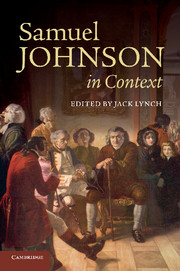Book contents
- Frontmatter
- Contents
- Illustrations
- Contributors
- Preface
- Chronology
- Abbreviations
- Part I Life and works
- Part II Critical fortunes
- Part III Contexts
- Chapter 10 America
- Chapter 11 Anglicanism
- Chapter 12 Anthropology
- Chapter 13 Authorship
- Chapter 14 Biography
- Chapter 15 Book trade
- Chapter 16 Clubs
- Chapter 17 Conversation
- Chapter 18 Dictionaries
- Chapter 19 Domestic life
- Chapter 20 Education
- Chapter 21 Empire
- Chapter 22 Essays
- Chapter 23 Fiction
- Chapter 24 History
- Chapter 25 Journalism
- Chapter 26 Law
- Chapter 27 Literary criticism
- Chapter 28 London
- Chapter 29 Medicine
- Chapter 30 Mental health
- Chapter 31 Money
- Chapter 32 Nationalism
- Chapter 33 Philosophy
- Chapter 34 Poetry
- Chapter 35 Politics
- Chapter 36 Scholarship
- Chapter 37 Science and technology
- Chapter 38 Scotland
- Chapter 39 Sermons
- Chapter 40 Shakespeare
- Chapter 41 Slavery and abolition
- Chapter 42 Social hierarchy
- Chapter 43 Theatre
- Chapter 44 Travel
- Chapter 45 Visual arts
- Chapter 46 War
- Chapter 47 Women writers
- Further reading
- Index
- References
Chapter 47 - Women writers
from Part III - Contexts
Published online by Cambridge University Press: 05 June 2012
- Frontmatter
- Contents
- Illustrations
- Contributors
- Preface
- Chronology
- Abbreviations
- Part I Life and works
- Part II Critical fortunes
- Part III Contexts
- Chapter 10 America
- Chapter 11 Anglicanism
- Chapter 12 Anthropology
- Chapter 13 Authorship
- Chapter 14 Biography
- Chapter 15 Book trade
- Chapter 16 Clubs
- Chapter 17 Conversation
- Chapter 18 Dictionaries
- Chapter 19 Domestic life
- Chapter 20 Education
- Chapter 21 Empire
- Chapter 22 Essays
- Chapter 23 Fiction
- Chapter 24 History
- Chapter 25 Journalism
- Chapter 26 Law
- Chapter 27 Literary criticism
- Chapter 28 London
- Chapter 29 Medicine
- Chapter 30 Mental health
- Chapter 31 Money
- Chapter 32 Nationalism
- Chapter 33 Philosophy
- Chapter 34 Poetry
- Chapter 35 Politics
- Chapter 36 Scholarship
- Chapter 37 Science and technology
- Chapter 38 Scotland
- Chapter 39 Sermons
- Chapter 40 Shakespeare
- Chapter 41 Slavery and abolition
- Chapter 42 Social hierarchy
- Chapter 43 Theatre
- Chapter 44 Travel
- Chapter 45 Visual arts
- Chapter 46 War
- Chapter 47 Women writers
- Further reading
- Index
- References
Summary
WO′MAN. [wifman, wimman, Saxon; whence we yet pronounce women in the plural, wimmen, Skinner.]
1. The female of the human race.
O woman, lovely woman, nature form’d thee
To temper man: we had been brutes without thee. Otway.
“I dined yesterday at Mrs. Garrick’s, with Mrs. Carter, Miss Hannah More, and Miss Fanny Burney,” said Samuel Johnson in 1784. “Three such women are not to be found: I know not where I could find a fourth, except Mrs. Lennox, who is superiour to them all” (Boswell, Life, 4:275). More remarkable than Frances Burney’s chagrin at this striking remark is Boswell’s neglect of the obvious leads with which it presented him. He says little in his biography about the other authoresses named here, all of whom could have filled gaps in his Life, especially concerning Johnson’s early years.
Boswell had no interest in his subject’s relations with intellectual women. The record shows, though, that Samuel Johnson was throughout his career the friend, supporter, and champion of female writers, whether they be translators, poets, playwrights, or novelists. From his first days, laboring on the Gentleman’s Magazine and picking up whatever jobs he could, he thought of them as fellow authors, struggling like him to gain a living in a literary marketplace that was undergoing critical changes (see chapter 13, “Authorship”). Nothing, in fact, demonstrates Johnson’s extraordinary freedom from the commonplace prejudices of his time more than his relationships with them. To see this is to realize that there is an alternative to Boswell’s story about Johnson’s life – focused on Johnson in the later, more comfortable circumstances of his life and in largely masculine company – that demands to be told.
- Type
- Chapter
- Information
- Samuel Johnson in Context , pp. 400 - 406Publisher: Cambridge University PressPrint publication year: 2011



